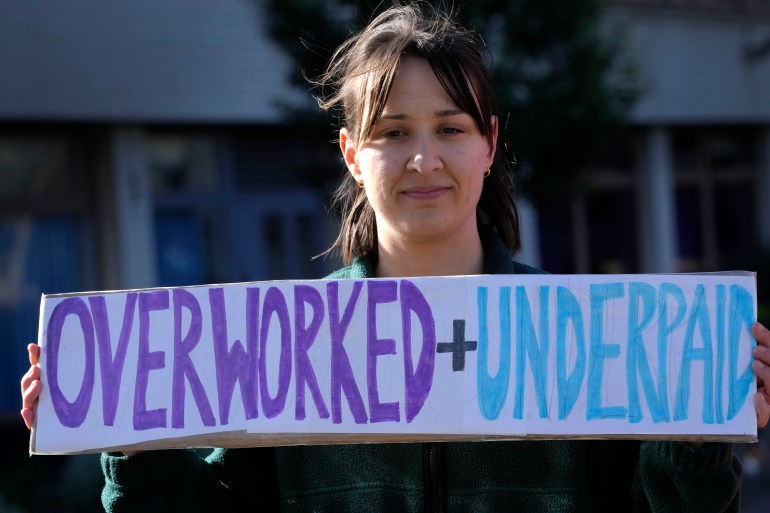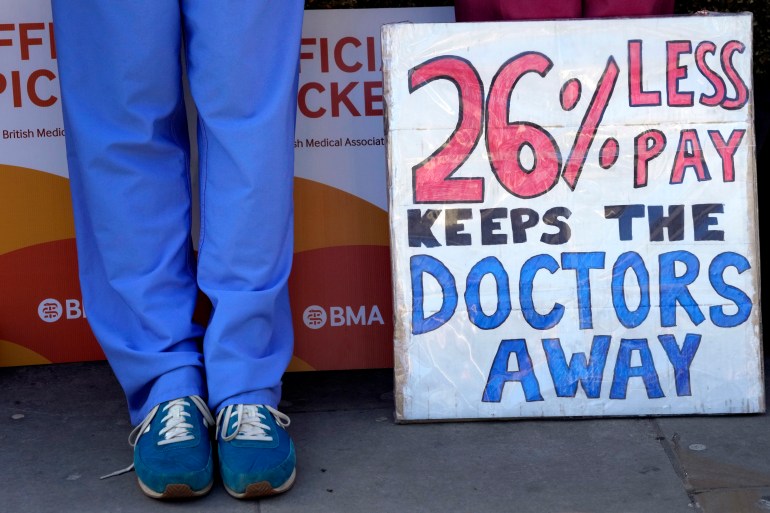Up to a quarter of a million appointments could be postponed in the longest stoppage of the wave of unrest in the UK.
Junior doctors across England have launched a four-day strike over pay that is likely to cause unprecedented disruption to the health service, leaving up to a quarter of a million appointments postponed.
Doctors mounted picket lines outside hospitals from 7am on Tuesday to run until Saturday morning in the longest stoppage of the wave of unrest, which has seen nurses, ambulance crews and other health workers take action since last year.
Tens of thousands of junior doctors – qualified physicians who make up nearly half of the medical workforce – are striking for pay rises better aligned with inflation, in the latest disruption to affect the state-funded National Health Service (NHS).
The British Medical Association (BMA), the union representing doctors, wants a 35 percent rise, arguing that members have suffered a 26 percent real-terms cut in pay over 15 years.
Tuesday’s walkout followed a three-day doctors’ strike last month.

“This next round of strikes will see unparalleled levels of disruption, and we are very concerned about the potential severity of impact on patients and services across the country,” NHS England National Medical Director Stephen Powis said.
He said there will be “considerably more” cancellations in operations and procedures this time than the 175,000 that were rescheduled during the previous walkout, but added the NHS was working to ensure emergency services are kept intact.
“We’ve also asked (hospitals) to reschedule procedures and outpatients as quickly as possible but this will take weeks to recover from,” Powis told BBC Radio.
The BMA has said the strikes by junior doctors, some of whom are very experienced, could be stopped if Health Secretary Steve Barclay put a credible pay offer forward.
“Not only will the walkouts risk patient safety, but they have also been timed to maximise disruption after the Easter break,” Barclay said in a statement.
He says the BMA’s demands are unreasonable and would mean an increase of more than 20,000 pounds ($24,840) for some doctors.
The health secretary said the “unrealistic” demand had led to a breakdown in talks.
“This demand is widely out of step with pay settlements in other parts of the public sector at a time of considerable economic pressure on our country,” Barclay wrote in the Sunday Telegraph.
The BMA has previously said it was willing to enter talks with Barclay and suspend strikes if members were presented with a “credible” pay offer “to resolve 15 years of pay erosion”.

“We were knocking on the health secretary’s door, asking to meet with him to negotiate a settlement to this dispute, long before the current strike got under way,” Dr Vivek Trivedi, the BMA junior doctors committee co-chairman, said.
“We have been in a formal dispute since October. He refused to respond and meet us until we had a strike ballot result. He has had months to put a credible offer on the table and avert industrial action, so for him to say, ‘It’s disappointing,’ is at best disingenuous.
“We would still be willing to suspend strike action this week if the secretary of state makes a credible offer that can be the basis of negotiation.”
The strike is the latest to involve NHS staff, following walkouts by nurses, paramedics and others demanding rises that better reflect annual inflation running at more than 10 percent.
The United Kingdom has been hit by strikes across broad swaths of the economy, with workers struggling with a cost-of-living crisis caused by double-digit inflation.


